In a major breakthrough, U.S. prosecutors have reached a plea deal with alleged Sept. 11 mastermind Khalid Sheikh Mohammed, the Pentagon said Wednesday, that would involve a guilty plea in exchange for avoiding a death penalty trial.
The agreements with Mohammed and two other defendants move toward resolution of their long-running cases, which have been mired in pretrial maneuvers for years while the defendants were held at the Guantanamo Bay military base in Cuba.
A Pentagon statement said details of the agreement would not be made public immediately at this time, but New York Times Mohammed, Walid bin Attash and Mustafa al-Hawsawi were reported to have agreed to plead guilty to conspiracy in exchange for a life sentence rather than a trial after being eligible for the death penalty.
Prosecutors detailed a proposal in a letter last year, but it has divided families of the nearly 3,000 people killed in the Sept. 11, 2001, attacks, and some still want the defendants to face the maximum penalty.
Much of the legal wrangling over the men's cases has centered on whether they could be tried fairly after being methodically tortured by the CIA in the years after 9/11 — a thorny issue that the plea deals help avoid.
Mohammed was considered one of al-Qaeda chief Osama bin Laden's most trusted and intelligent lieutenants before his capture in Pakistan in March 2003. He then spent three years in secret CIA prisons before arriving at Guantanamo in 2006.
The professional engineer – who claimed to have planned the 9/11 attacks “from A to Z” – was involved in a number of major plots against the United States, where he had attended university.
In addition to masterminding the operation to topple the Twin Towers, Mohammed claims to have personally beheaded American journalist Daniel Pearl in 2002 with his “blessed right hand” and to have assisted in the 1993 attack on the World Trade Center that killed six people.
The prison of the 'war on terror'
Bin Attash, a Saudi of Yemeni origin, allegedly trained two of the hijackers who carried out the Sept. 11 attacks, and his U.S. interrogators also said he confessed to buying the explosives and recruiting members of the team that killed 17 sailors in an attack on the USS Cole.
He took refuge in neighbouring Pakistan after the US invasion of Afghanistan in 2001 and was captured there in 2003, later held in a network of secret CIA prisons.
Hawsawi is suspected of having helped finance the 9/11 attacks. He was arrested in Pakistan on March 1, 2003, and held in secret prisons before being transferred to Guantanamo in 2006.
The United States used Guantanamo, an isolated naval base, to hold captured militants during the “War on Terror” that followed the 9/11 attacks, in an attempt to prevent defendants from claiming their rights under U.S. law.
At its busiest, the facility held as many as 800 prisoners, but they have since been slowly repatriated to other countries. President Joe Biden promised before his election that he would try to close Guantanamo, but the facility remains open.
In another case related to the Sept. 11 attacks, the Justice Department rejected a request by Zacarias Moussaoui, the so-called “20th hijacker,” to serve the remainder of his life sentence in France.
In a handwritten letter to District Judge Leonie Brinkema obtained by the website Legal Insurrection, Moussaoui, the only person convicted in the United States in connection with the 9/11 attacks, expressed fears of being executed if Donald Trump regains the presidency in November.
A Justice Department spokeswoman said the department does not review prisoner transfer requests, but noted that Moussaoui is “serving a life sentence following convictions for terrorism offenses.”
“The Department of Justice plans to enforce this life sentence in U.S. custody,” the spokeswoman added.












